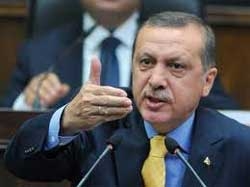Turkey to build canal to bypass Bosphorus: PM
 |
| Prime Minister Recep Tayyip Erdogan - illustration photo |
"We are rolling up our sleeves for Canal Istanbul, one of the greatest projects of the century that will outshine the Panama and Suez canals," Erdogan told a party gathering.
The waterway, to cut through Istanbul's European side, would be 40-50 kilometres (25-30 miles) long, with a width of about 150 metres (164 yards) and depth of 25 metres, he said.
The announcement of the plan -- long kept secret as Erdogan's "crazy project" -- came as part of the prime minister's pledges ahead of parliamentary elections on June 12, in which his Islamist-rooted party would seek a third straight term in power.
Preliminary studies and the drawing up of the project, expected to take two years, will start after the elections, Erdogan said.
He declined to disclose the exact location for the waterway and its estimated cost, but added that "financing will not be a problem."
"One of the main objectives is to reduce traffic through the Bosphorus and minimise the (environmental) threat," he said, stressing that about 140 million tonnes of oil were currently transported through the narrow waterway.
Erdogan, who served as mayor of Istanbul between 1994 and 1998, has other ambitious plans to transform the city.
In mid-April he announced plans to build two new towns on both sides of the city, while a tender to construct a third bridge over the Bosphorus will be held this summer.
A Turkish-Japanese consortium is currently building a rail tunnel under the Bosphorus to ease the congested traffic in Turkey's greatest city.
"There is a kind of megalomaniacal desire to transform Istanbul into a large square of cruise tourism and a major financial center with all these large projects... This is a very-short term and ostentatious management style," said researcher Jean-Francois Perouse, director of the Urban Observatory of Istanbul.
For Perouse, the real challenges that should be tackled for the survival of the city are environmental and social justice related issues.
The Bosphorus, which bisects Istanbul, Turkey's largest city with some 13 million people, is the world's fourth busiest waterway, and together with the Dardanelles Strait, connects the Black Sea to the Mediterranean.
It is difficult to navigate because of its sinuous geography and treacherous currents.
Turkey has long warned that increase in maritime traffic, coupled with the growing size of oil tankers, make for a disaster waiting to happen, and has promoted oil pipelines through its territory.
In 1979 and in 1994, tanker crashes in the Bosphorus, whose shores are dotted with posh waterside villas, restaurants and historic sites, claimed 41 and 28 lives respectively.
Erdogan said the new channel would afford the daily passage of up to 160 vessels, including the largest ships, and would have bridges to allow car traffic.
Residential and business areas, complete with an airport that would be the third for Istanbul, would be built on the banks of the waterway, he said.
What the stars mean:
★ Poor ★ ★ Promising ★★★ Good ★★★★ Very good ★★★★★ Exceptional
 Tag:
Tag:
Related Contents
Latest News
More News
- France supports Vietnam’s growing role in international arena: French Ambassador (January 25, 2026 | 10:11)
- Foreign leaders extend congratulations to Party General Secretary To Lam (January 25, 2026 | 10:01)
- Russian President congratulates Vietnamese Party leader during phone talks (January 25, 2026 | 09:58)
- Worldwide congratulations underscore confidence in Vietnam’s 14th Party Congress (January 23, 2026 | 09:02)
- Political parties, organisations, int’l friends send congratulations to 14th National Party Congress (January 22, 2026 | 09:33)
- 14th National Party Congress: Japanese media highlight Vietnam’s growth targets (January 21, 2026 | 09:46)
- 14th National Party Congress: Driving force for Vietnam to continue renewal, innovation, breakthroughs (January 21, 2026 | 09:42)
- Vietnam remains spiritual support for progressive forces: Colombian party leader (January 21, 2026 | 08:00)
- Int'l media provides large coverage of 14th National Party Congress's first working day (January 20, 2026 | 09:09)
- Vietnamese firms win top honours at ASEAN Digital Awards (January 16, 2026 | 16:45)




















 Mobile Version
Mobile Version